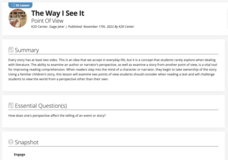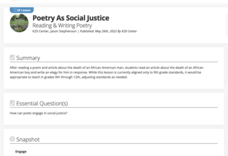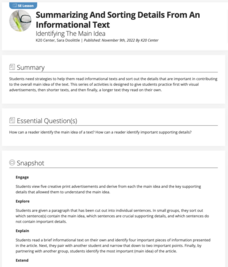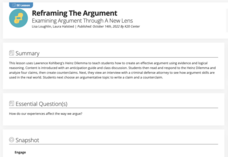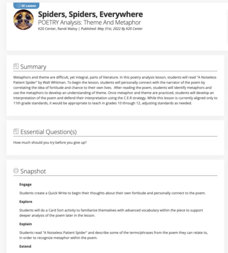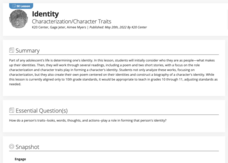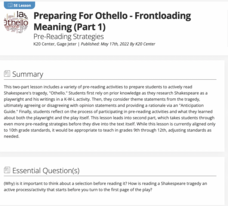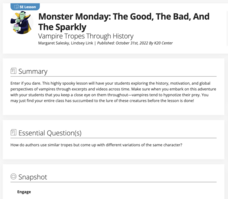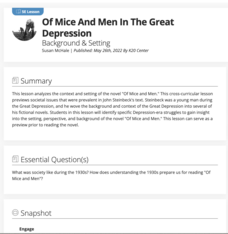K20 LEARN
Things Are Lit at Thornfield: Jane Eyre
Jane Eyre offers scholars an opportunity to practice reading comprehension skills. Pairs are assigned a word from the text, use their prior knowledge, and consider the context, connotation, and denotation of the word to posit a...
K20 LEARN
Civil Rights for All: Civil Rights Movement
The Civil Rights Movement was only the beginning. Using images and a series of queries, learners consider current fights for equality. After viewing video clips profiling the women's rights movement, the American Indian Movement, and...
K20 LEARN
Words Before Blows: Julius Caesar
Scholars examine how Brutus and Mark Antony employ ethos, pathos, and logos in their speeches to persuade the angry crowd in Act 3, scene 2 of William Shakespeare's tragedy, Julius Caesar. To set the stage, groups first identify the...
K20 LEARN
The Way I See It: Point of View
Robbers see a house from a different perspective than real estate agents. That's the big idea in a instructional activity about point of view. Groups assume the role of either robbers or real estate agents, note important details in a...
K20 LEARN
Totally Different Stories: Perspective
Two stories by Kate Chopin provide high school freshmen with an opportunity to reflect on the importance of the perspective from which a story is told. Class members read "The Story of an Hour" and a passage from The Awakening, then...
K20 LEARN
Use Your Noodle: Avoiding Comma Blunders
Young grammarians will go to town with a lesson that doodles with macaroni! Scholars cook up sentences with the addition of commas, which makes all the difference in their meaning.
K20 LEARN
Speak Your Truth: Techniques in Spoken Word Poetry
As part of a study of Spoken Word Poetry, class members watch a series of performance videos and note where poets get their ideas and the performance techniques used by the poets. Pupils then draft and share their poems.
K20 LEARN
Poetry as Social Justice: Reading and Writing Poetry
Words can be a powerful tool in the hands of a poet. Class members examine a poem written by Ross Gay in response to the death of Eric Garner and a news report of the same death. They then read an article about the death of Tamir Rice...
K20 LEARN
Street Cred: Evaluating Sources
A instructional activity on evaluating sources of information teaches scholars to "think twice" before using a source. Researchers examine a resource's home page, author, and sponsor, as well as the date published and the documentation...
K20 LEARN
Speak Up! Four Categories Of Speeches
High schoolers examine the four major types of speeches: informative, demonstrative, persuasive, and extemporaneous. Groups then select one type and craft and share a presentation highlighting this format's characteristics. Finally,...
K20 LEARN
Seeing the Big Picture - Incorporating Thesis, Evidence, Elaboration, and Concluding Statements in Your Essay: Elements of an Essay
Writers examine the elements of an informational essay, identify them in several essay snapshots, and then craft their own to demonstrate what they have learned.
K20 LEARN
Summarizing and Sorting Details from an Informational Text: Identifying the Main Idea
Scholars participate in two activities that teach them to identify the main idea and key supporting details in informational text. Partners create a visual that reflects the main idea and key supporting details in an informational text...
K20 LEARN
Presenting with Confidence: Speech and Debate
Stage fright? Class members learn strategies to overcome stage fright and develop confidence when giving speeches and engaging in debates.
K20 LEARN
Reframing the Argument: Examining Argument through a New Lens
As part of a study of crafting compelling arguments, class members tackle the problem presented in Lawrence Kohlberg's "The Heinz Dilemma." After discussing the dilemma with classmates, writers draft an essay with a claim, support it...
K20 LEARN
"The Interlopers": Are You Ready to Rumble? Conflict, Motivation, and Setting
Capulets and Montagues. Sharks and Jets. Nortenos and Surenos. Gradwitzes and Znaeyms? Hector Hugh Munro's short story "The Interlopers" invites high schoolers to consider the causes of conflicts and reflect on what it takes to resolve...
K20 LEARN
Spiders, Spiders, Everywhere: Poetry Analysis - Theme And Metaphor
Walt Whitman's poem "A Noiseless Patient Spider" provides high schoolers an opportunity to reflect on the importance of perseverance and fortitude. After drafting a Quick Write about a time they tried and tried again to accomplish...
K20 LEARN
Identity: Characterization/Character Traits
"Who am I?" Guy de Maupassant's short story "The Necklace," Julio Naboa Polanco's poem "Identity," and a clip from a Jason Bourne film provide learners with a context to consider the traits that makeup identity. Scholars create a...
K20 LEARN
Preparing for Othello - Frontloading Meaning (Part 2): Pre-reading Strategies
The second lesson in a two-part series that prepares high schoolers for a study of Othello focuses on additional pre-reading strategies. Pupils reflect on what they have learned and consider what they would like to learn about the play....
K20 LEARN
Preparing for Othello - Frontloading Meaning (Part 1): Pre-reading Strategies
The success of any lesson based on a complex text relies heavily on what instructors do before beginning the reading. Before reading Othello, scholars engage in a series of pre-reading activities, including completing an anticipation...
K20 LEARN
Sentence Structure in Siddhartha: Simple, Compound, Complex, and Compound-Complex Sentences
While wisdom may not be communicated, knowledge of sentence structures certainly can. Teach young grammarians the power of syntax with a lesson that uses Herman Hesse's Siddhartha as a mentor text. Learners first rewrite captions for an...
K20 LEARN
Say It with Style: Syntax and Parallel Structure
Dr. Martin Luther King, Jr.'s "I Have a Dream" speech provides the text for a lesson that introduces scholars to the significance of syntax. After examining several types of clauses, phrases, and structures, class members use the...
K20 LEARN
Monster Monday - The Good, the Bad, and the Sparkly: Vampire Tropes through History
Fangs, capes, pale skin, and beady eyes! High schoolers investigate the tropes associated with vampires by examining excerpts from stories and films. They then create a timeline that reveals how the depictions of vampires have evolved...
K20 LEARN
Of Mice and Men in the Great Depression: Background and Setting
What were living conditions like in the United States during The Great Depression, and how do those conditions compare with today? That's the question young scholars consider as they prepare to read John Steinbeck's Of Mice and Men....
K20 LEARN
It's All About Balance! Parallel Structure
I came, I saw, I conquered! Parallel structure, employed by writers even before Julius Caesar, is the focus of a lesson that teaches young writers the power of this rhetorical device. Class members analyze speeches by Dr. Martin Luther...





